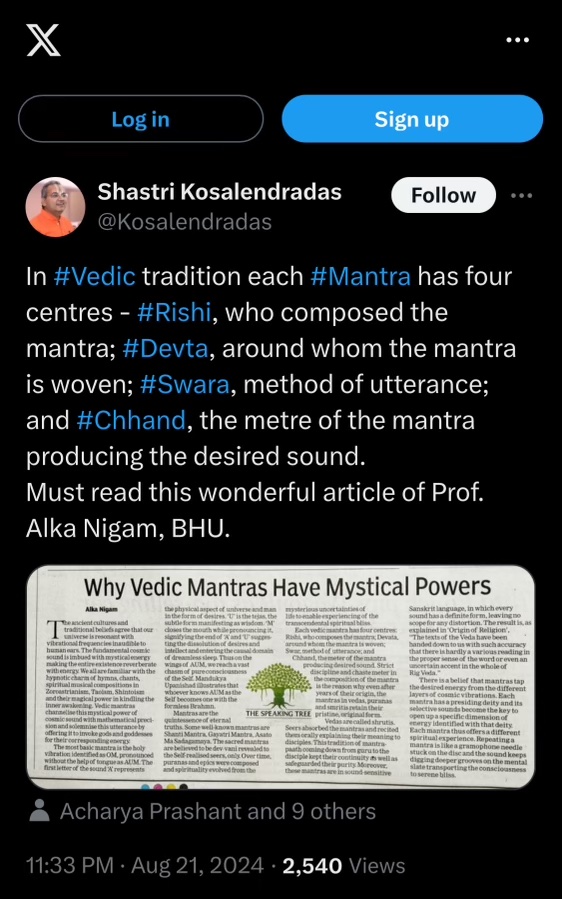https://www.speakingtree.in/article/the-eighteen-puranas-727624
The Puranas have revitalised and revolutionised spirituality propounded in the Vedas and Upanishads, and made it all-time relevant, writes ALKA NIGAM The vast Vedic Vangmaya is a treasure trove of everything that is lofty in Hinduism. Since much of this ancient religious knowledge is a result of direct experiences of seers rather than a single author and conveyed in oral tradition, it was scattered. Krishna Dwaipayan divided this Vedic wisdom into four Vedas. He, with the help of other rishis, did the herculean task of compiling, collecting, and commenting on much of this literature and categorised it into 18Puranas. These Puranas, literal meaning ‘ancient’, are sometimes called the fifth Veda, because they carry on the knowledge of the Vedas in a simplified form.
Path Of Devotion
The Vedas are for savants and the path of enlightenment that of jnana; it is esoteric in nature. Puranas take the bhakti marg. The nirakar, formless, Brahmn of Vedas is turned into one deity exalted to the highest stature to become a personal God. Thus in texture, Puranas are Vedantic yet generally pantheistic. Sheer devotion, according to them, leads to the goal of salvation.
The incarnations become the physical manifestations of the abstract philosophical ideas, and make it easier for the masses to grasp the truth of life. Thus, the Puranas have revitalised and revolutionized spirituality propounded in the hoary Vedas and Upanishads and made it all-time relevant. They contain the complete body of teachings on the entire spectrum of life. All the topics integral to our lives as a thinking human being have been taken up, for example, from where have we come, where do we go, why things happen the way they do, how to settle harmoniously with our surroundings? Mythological in form, the Puranas are an intrinsic part of our culture. Their stories are deeply embedded in our psyche and are dear to us. In mythological stories, the deities, superheroes and the personified forces of nature, maintain a balance between the spiritual and temporal aspects. The teachings of the Puranas are precious and form the base of Hindu culture. The Bhagavata Purana is the most celebrated and popular text. Like the Kalpataru, the wish-fulfilling tree, it offers the glory of this world, and like seers, offers the wisdom to achieve the world beyond. A well-known story of Krishna and his childhood friend Sudama exemplifies how no action or thought ever goes unnoticed by nature. Once in the ashram of guru Sandipani, Sudama and Krishna went to the forest to collect wood. Gurumata gave a bag of roasted rice to Sudama, telling him to share it with Krishna. Suddenly it turned dark and began to rain. The friends took shelter on a tree. They were hungry. Krishna heard the hushed sound of eating and asked Sudama to give some rice to him, too. Sudama became greedy and said Gurumata did not give anything to eat. Krishna tried to save his friend from the misfortune of poverty that was coming his way. Sudama was persistent in his denial. Krishna smiled feebly. Nature gave one more opportunity to Sudama to amend his act. When Krishna was the king of Dwarka, on the advice of his wife, poor Sudama went to seek his help. When Krishna heard that Sudama had arrived, he came running and embraced him. But the poor brahmin was so awestruck, that out of shame he hid from Krishna, the petty gift of rice he was carrying. Earlier it was the boyish greed, this time, it was the mature man’s shame. Krishna had to snatch it from him. Things changed miraculously for Sudama thereafter, for now, he had parted with the thing which was not his. Fortunately, in this story, Sudama had God’s protection. But the Puranas through their narratives reiterate that nature, in myriad ways, helps everyone. What we give, comes back and becomes our destiny.
The Uddhava Gita
Interestingly, the Bhagavata Purana has in its treasure, Krishna’s last discourse — the Uddhava Gita — addressed to another friend Uddhava. It explains the concept of Avadhuta and tells the story of Dattatreya who had 24 gurus. To make Uddhava come out of the clutches of the bewitching maya, Krishna tells him the story of a family of doves who were wrapped up in their cocoon of comfort and perished in a hunter’s net one by one — first, the fledglings and the female and then the male dove, unable to bear the agony of each others’ approaching death. It is a lesson for us — never to forget the life beyond while enjoying this one. The stories in the Puranas strengthen our belief that spiritual laws are universal truths and do not belong to one age or one culture. These stories, serving as algorithms, form the foundation of our karmas. The story disappears, but the idea prevails for generations.

Leave a Reply